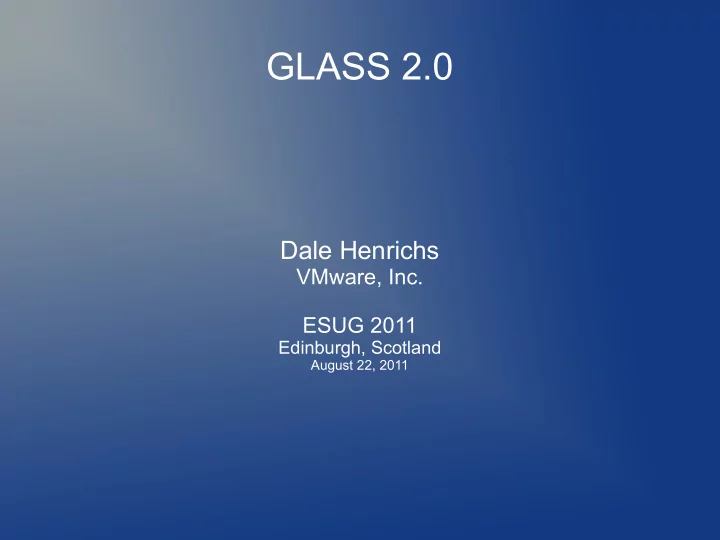

GLASS 2.0 Dale Henrichs VMware, Inc. ESUG 2011 Edinburgh, Scotland August 22, 2011
GLASS 2.0 ● Overview of GLASS ● VMware Cloud Foundry ● tODE demo
What is GLASS? ● A platform for deploying web-based Smalltalk applications in GemStone/S – Develop in Squeak/Pharo, Deploy in GemStone ● OmniBrowser-based development tools ● Compatibility layer for the Squeak and Pharo code base ● Many popular projects ported to GemStone/S
Why use GLASS? ● GemStone/S is a high performance, high reliability alternative when your web application outgrows a single vm – With the “transparent persistence” and “transparent concurrency” features of GLASS ● Add multi-vm persistence to web app without changes to your source code – Free for commercial use
Transparent Persistence ● GemStone is based on same persistence model used in Squeak/Pharo – Objects rooted in “Smalltalk” are considered persistent ● GemStone uses transactions instead of “save image” in Squeak/Pharo – commit ● Changed objects in vm saved to repository – abort ● Entire object graph in vm updated to current view – Dropping any changes on the floor
Transparent Persistence (cont'd) ● GemStone transaction logic is embedded in the web framework – Abort/Commit on HTPP request boundaries ● Fresh view at start, changes saved to disk before user sees response ● No additional application-level code needed
Transparent Concurrency ● On commit, GemStone merges changes to object graph with latest view in repository – if two vms concurrently update same object ● Commit conflict thrown ● Conflict management code embedded web framework – On conflict HTTP request is retried ● As if request had been delayed in arriving ● No additional application-level code needed
VMware Cloud Foundry ● Cloud Foundry is a platform for building, deploying, and running cloud-based apps – CloudFoundry.com is a complete, hosted environment offered by VMware – CloudFoundry.org is an open source project
Cloud Foundry and GLASS ● We are actively integrating GemStone/S and Maglev into Cloud Foundry framework ● Plans to include support for Seaside/Aida/Iliad/Pier ● When finished we'll have cloud-based hosting service for GLASS – Will make deploying to GemStone/S even easier
tODE the Object-centric Development Environment ● A Proof of Concept for a Smalltalk IDE that runs in a web browser – Written in Seaside – Ported to Pharo and GemStone – MIT license ● A small, powerful framework that is easy to customize
Why tODE? ● tODE was created to provide the Smalltalk IDE for deployed web-applications – The traditional Smalltalk GUI is too slow when used across the WAN – Limited access to machines running in cloud ● HTTP access only in Cloud Foundry ● Smalltalk without an IDE? – No way!
tODE paradigm ● Modeled on a web browser – tODE is an “Image Browser” – URL is a Smalltalk expression – LINKs follow object references – HISTORY is a stack of object references – PAGE is a set of tabbed PANES for an object – PANE contains a rendered aspect of the object
Sidebar Pane Navigation Pane History Pane Pane contents Frame Pane - Evaluate Smalltalk Expressions - List pane, when needed - History of visited frames/objects - Select tab to view aspect of the current object - Drawn by a renderer - Back button - View, Help, Inspect, Class and Method - The renderer is derived from a specification in a pragma method - Search - etc.
tODE Demo
Conclusion ● Successful Proof of Concept – Functional ... – Simple, extensible framework – Need a (web framework) neutral rendering language – Need a bit of CSS and javascript polish
Future work ● tODE – Head towards alpha release ● GemStone/S for Cloud Foundry – Keep an eye out for further info ● For more info – http://seaside.gemstone.com/ – http://cloudfoundry.org/ – http://code.google.com/p/tode/ – http://gemstonesoup.wordpress.com
Recommend
More recommend